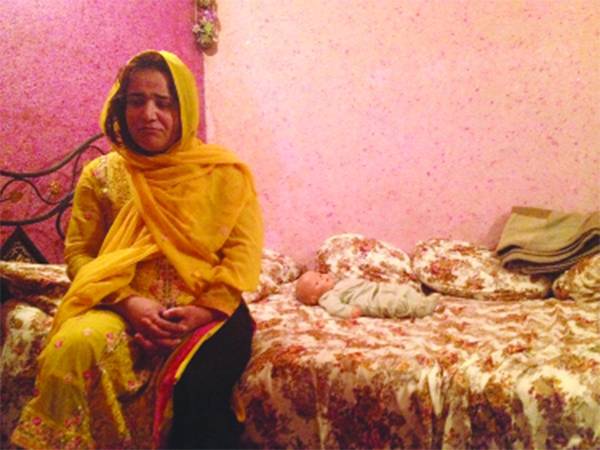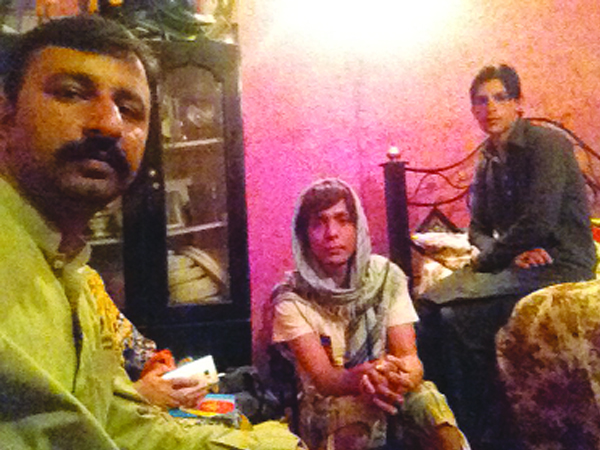
Reema clutches a bald baby doll. She is 38 years old. The reason for her unusual choice of companion is simple. She cannot give birth. The toy is a substitute for something she cannot have or give. “We want to feel the warmth of a mother’s love for a baby so I keep it with me all the time,” she says.
Reema is one of the scores of transgenders who live in Muzaffarabad, Azad Jammu and Kashmir. Many of them have already moved or are moving to Mansehra because they are finding it hard to earn a living and are, frankly, fed up with the insults and police brutality. According to right activists, the transgender community in Pakistan still has some legislation that pledges to provide them equal rights. In Azad Jammu and Kashmir this is not the case.
Reema was 12 years old when she left home and joined the trans community. At one point she moved to Mansehra where she learnt how to dance from her guru. She returned to Muzaffarabad to try to earn a living by performing at wedding ceremonies. But now she is thinking of going back.
“I don’t know who to blame for me being the third gender,” she says. Should she blame her parents who tossed her out? Or her fellow human beings who had nothing but slurs to offer. “Me and my friends have been rejected and were deprived of a family when our parents realized that we were not ‘normal’.”
Of late the police had been particularly active. “We are being raided, arrested and harassed and as a result a large number of transgenders have moved to Mansehra, a neighboring Khyber Pakhtunkhwa district where their gurus are settled.”
An estimated 63% of transgender people in Muzaffarabad are migrants while 37% are locals, according to Step to Empowering CEO Shaista Rehman, who works in the area. According to her, 74 transgenders were living in the capital before the recent police action. But a majority left for mostly Mansehra. At present, she says 20 to 30 people are left and they too are internally displaced. “Due to the lack of special laws to protect their fundamental rights, we observed that transgenders are migrating,” she says. Some help comes the nonprofit organization in the shape of food.

According to 29-year-old Bubbly, the police started taking action against them over baseless media reports that transgenders were harassing people. Twelve of the people who lived with her have moved to Khyber Pakhtunkhwa or Punjab.
A policeman at City police station corroborated this information. He said that they were tipped off that the transgender people were involved in sex work and drugs. That is why they raided a few residential areas. He said they had arrested dozens of transgender persons on these charges.
In 2016, Aurat Foundation and USAID prepared a research study titled “Silent No More: The Transgender Community in Pakistan”. They found that a major source of income for 79% of the transgenders of Muzaffarabad is dancing. Begging and sex work are their alternate sources of income.
They earn the most dancing at weddings, but as society has changed, these customs have started to die out. This income is also seasonal, which is why they prefer sex work and begging as it is more financially stable. Those who are considered more attractive choose dancing and sex work, while the older ones are forced to beg.
Their inability to earn a living is linked to poor literacy rates. The Aurat Foundation report says that half of the transgenders of Muzaffarabad, the capital city of AJ&K, is illiterate. Only 6% have primary, 19% middle and 13% secondary education. Only 6% of transgenders have higher secondary and post-graduate education. Almost 65% of them earn Rs10,000 or less.
Eighteen-year-old Pinky had a dream of becoming a doctor but she soon realized in the middle of her schooling that there was too much stigma attached. She dropped out when in grade 9 because she was bullied every day. Her family told her not to meet people that much. “Why do we not have the right to get the same educational opportunities as any other citizen,” she asks. Her other friends had similar dreams.
She mentions the Allama Iqbal Open University which has started a free education program for transgender people and urged the government to adopt the same policy at other formal educational institutions. “It may help my community get space in society,” she says.
Thirty-six-year old Saba had more luck. She managed to graduate after the death of her parents—but she could not get a job as she wasn’t qualified enough. “I applied for a number of vacant posts in government institutions,” she says. “I even tried to get a job in the private sector.”
Saba paid for the education of her five sisters by dancing at weddings and at other private events. “I sponsored their weddings and they are all living happily with their families but I cannot see them or meet them due to society’s attitude toward my community,” she adds.
Other non-profit organisations have not worked in this area. Mukhtar Ahmed Awan of the Social Welfare Officer in Muzaffarabad confessed that they simply did not do enough. “In the past, we had thought of compiling data and doing some welfare work for the transgender community,” he said. “But we couldn’t due to a lack of funds.”
As for the government, not much can be said. Noreen Arif is the AJ&K minister for social welfare and women’s development. She told TFT that the state government was set to launch a program to protect the fundamental rights of all vulnerable segments of society, including transgenders.
And so, those who can eke out a living in Muzaffarabad do but it is unlikely that their quality of life is going to change unless people’s attitudes change towards them. For as 35-year-old Nazo put it: “We face the cruelest behaviour everyday. We are humiliated the most by educated people.”
Reema is one of the scores of transgenders who live in Muzaffarabad, Azad Jammu and Kashmir. Many of them have already moved or are moving to Mansehra because they are finding it hard to earn a living and are, frankly, fed up with the insults and police brutality. According to right activists, the transgender community in Pakistan still has some legislation that pledges to provide them equal rights. In Azad Jammu and Kashmir this is not the case.
Reema was 12 years old when she left home and joined the trans community. At one point she moved to Mansehra where she learnt how to dance from her guru. She returned to Muzaffarabad to try to earn a living by performing at wedding ceremonies. But now she is thinking of going back.
74 transgenders were living in the AJ&K capital before the recent police action. But a majority left for mostly Mansehra
“I don’t know who to blame for me being the third gender,” she says. Should she blame her parents who tossed her out? Or her fellow human beings who had nothing but slurs to offer. “Me and my friends have been rejected and were deprived of a family when our parents realized that we were not ‘normal’.”
Of late the police had been particularly active. “We are being raided, arrested and harassed and as a result a large number of transgenders have moved to Mansehra, a neighboring Khyber Pakhtunkhwa district where their gurus are settled.”
An estimated 63% of transgender people in Muzaffarabad are migrants while 37% are locals, according to Step to Empowering CEO Shaista Rehman, who works in the area. According to her, 74 transgenders were living in the capital before the recent police action. But a majority left for mostly Mansehra. At present, she says 20 to 30 people are left and they too are internally displaced. “Due to the lack of special laws to protect their fundamental rights, we observed that transgenders are migrating,” she says. Some help comes the nonprofit organization in the shape of food.

According to 29-year-old Bubbly, the police started taking action against them over baseless media reports that transgenders were harassing people. Twelve of the people who lived with her have moved to Khyber Pakhtunkhwa or Punjab.
A policeman at City police station corroborated this information. He said that they were tipped off that the transgender people were involved in sex work and drugs. That is why they raided a few residential areas. He said they had arrested dozens of transgender persons on these charges.
In 2016, Aurat Foundation and USAID prepared a research study titled “Silent No More: The Transgender Community in Pakistan”. They found that a major source of income for 79% of the transgenders of Muzaffarabad is dancing. Begging and sex work are their alternate sources of income.
They earn the most dancing at weddings, but as society has changed, these customs have started to die out. This income is also seasonal, which is why they prefer sex work and begging as it is more financially stable. Those who are considered more attractive choose dancing and sex work, while the older ones are forced to beg.
Their inability to earn a living is linked to poor literacy rates. The Aurat Foundation report says that half of the transgenders of Muzaffarabad, the capital city of AJ&K, is illiterate. Only 6% have primary, 19% middle and 13% secondary education. Only 6% of transgenders have higher secondary and post-graduate education. Almost 65% of them earn Rs10,000 or less.
Eighteen-year-old Pinky had a dream of becoming a doctor but she soon realized in the middle of her schooling that there was too much stigma attached. She dropped out when in grade 9 because she was bullied every day. Her family told her not to meet people that much. “Why do we not have the right to get the same educational opportunities as any other citizen,” she asks. Her other friends had similar dreams.
She mentions the Allama Iqbal Open University which has started a free education program for transgender people and urged the government to adopt the same policy at other formal educational institutions. “It may help my community get space in society,” she says.
Thirty-six-year old Saba had more luck. She managed to graduate after the death of her parents—but she could not get a job as she wasn’t qualified enough. “I applied for a number of vacant posts in government institutions,” she says. “I even tried to get a job in the private sector.”
Saba paid for the education of her five sisters by dancing at weddings and at other private events. “I sponsored their weddings and they are all living happily with their families but I cannot see them or meet them due to society’s attitude toward my community,” she adds.
Other non-profit organisations have not worked in this area. Mukhtar Ahmed Awan of the Social Welfare Officer in Muzaffarabad confessed that they simply did not do enough. “In the past, we had thought of compiling data and doing some welfare work for the transgender community,” he said. “But we couldn’t due to a lack of funds.”
As for the government, not much can be said. Noreen Arif is the AJ&K minister for social welfare and women’s development. She told TFT that the state government was set to launch a program to protect the fundamental rights of all vulnerable segments of society, including transgenders.
And so, those who can eke out a living in Muzaffarabad do but it is unlikely that their quality of life is going to change unless people’s attitudes change towards them. For as 35-year-old Nazo put it: “We face the cruelest behaviour everyday. We are humiliated the most by educated people.”

